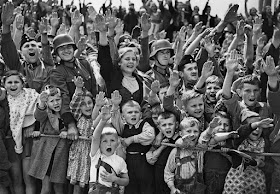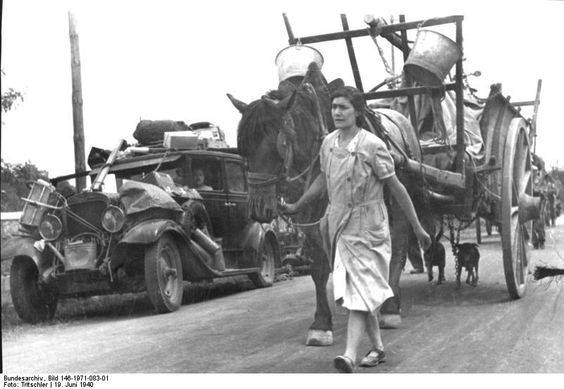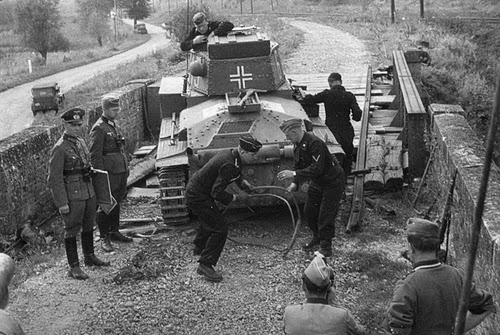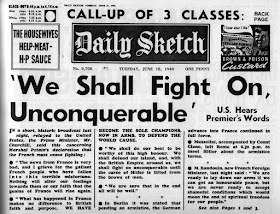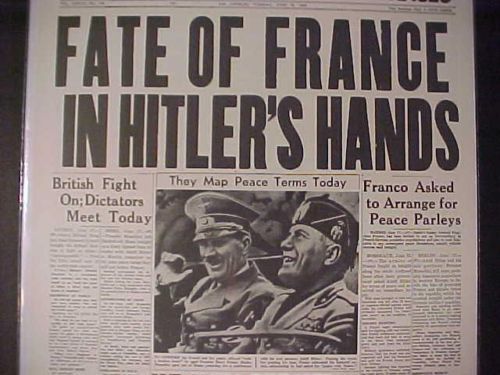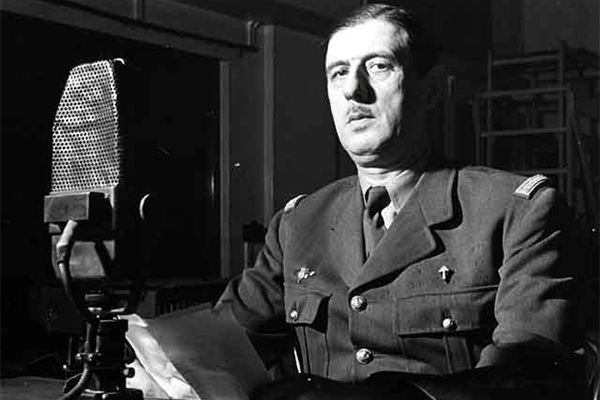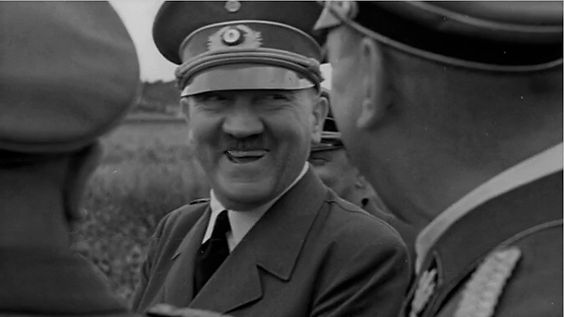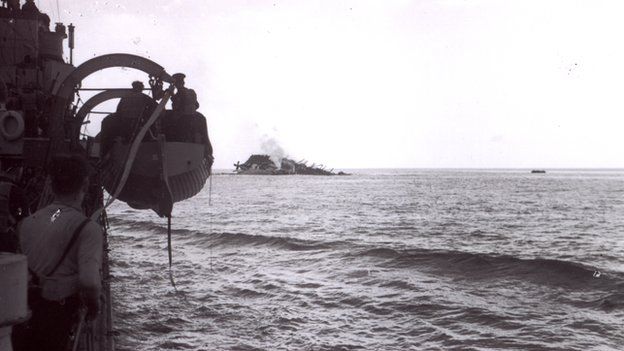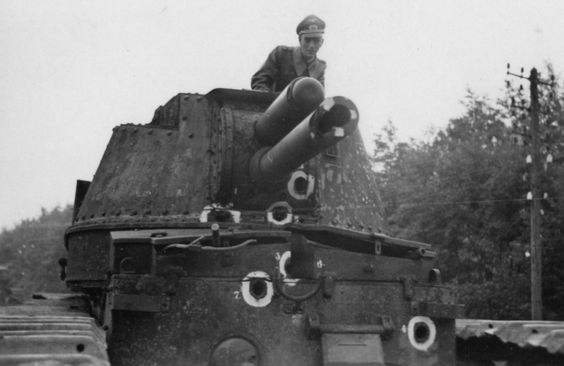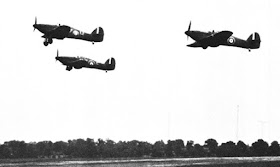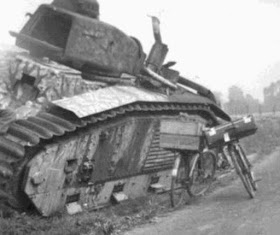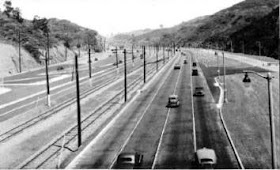Thursday 20 June 1940
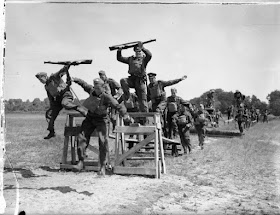 |
| Coldstream Guards running an assault course in full kit on 20 June 1940 (War Office Official Collection, Catalogue No. H 1887, War Office Official photographer Lt. E.G. Malindine). |
The cadets at the Saumur military academy are forced to surrender when they run out of ammunition. 200 cadets perish.
There are continued German advances throughout the country. The Maginot Line remains a strong point for the French, despite numerous penetrations, but elsewhere the defense is "fluid." There is heavy fighting around Thionville. The Wehrmacht 12th Army captures Lyons and Vichy.
French XLV Corps crosses the border into Switzerland and is interned.
Italy masses 32 divisions divided into two armies on the French border in the Alps. The French see no reason to fight Italy when it already is trying to sue for peace with Germany and request an armistice. Mussolini, however, wants to occupy French territory to improve his bargaining position, not necessarily in France, but in North Africa. The Italians stand ready to launch their long-awaited offensive against French positions in the Riviera north to Mount Blanc.
Operation Ariel continues at a rapidly dwindling pace, picking up scattered troops in southern France. At La Pallice, a few more Polish troops and assorted embassy and consular staffs are taken off, and the ships proceed south to find more evacuees. At Bordeaux and the nearby ports on the Garonne River in the Gironde départment in Aquitaine, the Polish ships Batory, Sobieski and the Ettrick and Arandora Star complete their operations and head south as well. The main port for evacuation from this point forward is St Jean-de-Luz on the Spanish border.
As Bordeaux is no longer a focus of evacuation, the British destroyer HMS Beagle lands a demolition team to disable the port facilities.
French plenipotentiaries, led by General Huntziger, leave Bordeaux by car to meet with the Germans at Compiegne. Hitler has chosen that location due to its symbolism as the spot where Germany surrendered to the Allies in World War I. German engineers are sent to a French museum to prepare the same French railway coach for the proceeding.
U-30 (Kapitänleutnant Fritz-Julius Lemp) torpedoes and sinks 4,876-ton British freighter Otterpool 130 miles west of Ushant, France. There are 16 survivors and 23 perish. The ship is sailing with Convoy HG-34F.
U-38 (Kapitänleutnant Heinrich Liebe) torpedoes and sinks 1,776-ton Swedish freighter Tilia Gorthon in the eastern Atlantic. There are 11 survivors, while 10 perish.
U-48 (Korvettenkapitän Hans Rudolf Rösing) torpedoes and sinks 7,493-ton Dutch tanker Moordrecht in the eastern Atlantic. There are 4 survivors, 25 perish.
The 7,638-ton French tanker Brumaire, torpedoed and damaged on 19 June 1940 by U-25, is sunk by a Luftwaffe attack.
Admiral Günther Lütjens sails heavy cruisers Gneisenau, Admiral Hipper, and four destroyers toward Iceland as part of an elaborate decoy mission as Scharnhorst, previously damaged by a torpedo, limps back to Germany. About 40 nautical miles (74 km; 46 mi) northwest of Halten, submarine HMS Clyde torpedoes Gneisenau. This causes extensive damage to the bow area, flooding two compartments, and the squadron returns to Trondheim for repairs.
Polish submarine Wilk accidentally rams Dutch submarine O-13, sinking it.
The Royal Navy intercepts two destroyers and two torpedo boats that were constructed in Italian shipyards and purchased by Sweden near the Faeroe Islands.
British submarine HMS Tigris (N 63, Lt. Commander Howard F. Bone) is commissioned.
British minesweeping trawler HMS Acacia (T 02, Commander Ralph Newman) is commissioned.
Armed yacht HMCS Elk (S 05, Lt. Commander Norman V. Clark) is commissioned.
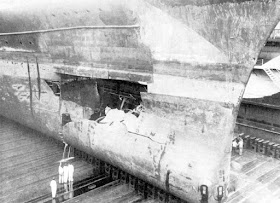 |
| The Gneisenau's torpedo damage as photographed on 20 June 1940. |
The Regia Aeronautica bombs Calvi in Corsica.
North Africa: British mechanized troops in Sudan make raids across the Eritrean border.
The RAF raids Diredawa, Abyssinia. It also bombs Italian positions across the Libyan frontier.
The Regia Aeronautica sends 6 CANT Z.506 bombers against French positions at Bizerte, Tunisia.
Royal Navy submarine Parthian sinks Italian destroyer Diamante off Tobruk.
An Anglo/French squadron bombards Italian positions at Bardia during the night.
Mussolini asks Italian commander Italo Balbo to make more progress in the region. Balbo, the long-time commander in the region, responds, "We have no trucks, no anti-tank guns; it's steel versus flesh."
Latvia: A new Soviet puppet government is formed in Riga. The Soviets take the Latvian minesweeper Virsaitis.
Romania: King Carol pardons all imprisoned members of the Iron Guard in order to curry favor with Hitler.
Uruguay: Heavy cruiser USS Quincy (CA 39) arrives in Montevideo from Rio de Janeiro as part of its "show the flag" journey.
British Military: The first Australian and New Zealand troops (Anzacs) arrive in Great Britain. General Blamey arrives in Palestine to organize Anzacs there.
Anglo/US Relations: The British agree to purchase the entire US production of Thompson sub-machine guns, 300 tons per week. They are scheduled for weekly deliveries.
Anglo/Spanish Relations: The Duke of Windsor, widely suspected of having pro-German sympathies, arrives in Barcelona after having fled Paris.
Anglo/French Relations: General Mittelhauser, commanding French forces in the Levant, informs General Wavell at British headquarters in Cairo that he will join the Free France movement and remain an ally.
Japanese/French Relations: Governor-General Catroux, acting independently because he has no support from the French government or anyone else, allows a Japanese control commission into French Indochina (Vietnam). He agrees to stop shipping arms to China through the country.
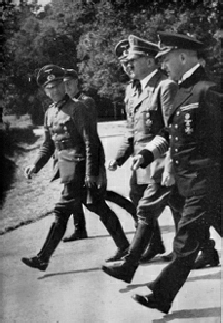 |
| Von Brauchitsch, Keitel, Hitler and Raeder at the Fuhrer HQ at Brûly-de-Pesche, 5660 Couvin, Belgium. 20 June 1940. |
As part of this reshuffling, Roosevelt establishes the position of Undersecretary of the Navy.
The Bureau of Ships is established with Rear Admiral Samuel M. Robinson as its first head. It replaces the Bureau of Construction and Repair and the Bureau of Engineering.
Light cruiser USS Phoenix (CL 46) departs from Pearl Harbor for the Panama Canal Zone, where it will begin a "show the flag" mission on the Pacific coast of South America.
French Government: A delegation from the two French legislative chambers approaches Pétain to complain about the desire of President Lebrun to leave for North Africa. There remain wide divisions within the government regarding the possibility of continuing the fight from Algeria and Tunisia.
Heavy cruiser USS Vincennes (CA 44), escorted by destroyers USS Truxtun (DD 229) and USS Simpson (DD 221), arrives at the Brooklyn Navy Yard with the gold reserves from the Bank of France.
American Homefront: Joe Louis has a rematch with Chilean boxer Arturo Godoy. Louis wins when the referee stops the fight in the 8th round.
Future History: Actor John Mahoney is born in Blackpool, Lancashire, England. He begins his acting career as the body double for Steve McQueen in 1977 and becomes famous for playing Martin Crane on NBC sitcom "Frasier" from 1993 to 2004.
June 1940
June 1, 1940: Devastation at Dunkirk
June 2, 1940: Hitler Visits France
June 3, 1940: Operation Paula
June 4, 1940: We Shall Fight
June 5, 1940: Fall Rot
June 6, 1940: Weygand Line Crumbling
June 7, 1940: British Evacuating Narvik
June 8, 1940: Operation Juno
June 9, 1940: Norway Capitulates
June 10, 1940: Mussolini Throws Down
June 11, 1940: Paris an Open City
June 12, 1940: Rommel at St. Valery
June 13, 1940: France Goes Alone
June 14, 1940: Paris Falls
June 15, 1940: Soviets Scoop Up Lithuania
June 16, 1940: Enter Pétain
June 17, 1940: The Lancastria Sinks
June 18, 1940: A Day of Leaders
June 19, 1940: U-boats Run Wild
June 20, 1940: Pétain Wilts
June 21, 1940: Hitler's Happiest Day
June 22, 1940: France Is Done
June 23, 1940: Hitler in Paris
June 24, 1940: Six Million Jews
June 25, 1940: German Celebrations
June 26, 1940: USSR Being Belligerent
June 27, 1940: Malta in Peril
June 28, 1940: Channel Islands Bombed
June 29, 1940: Gandhi Insists on Independence
June 30, 1940: Channel Islands Occupied
2020

